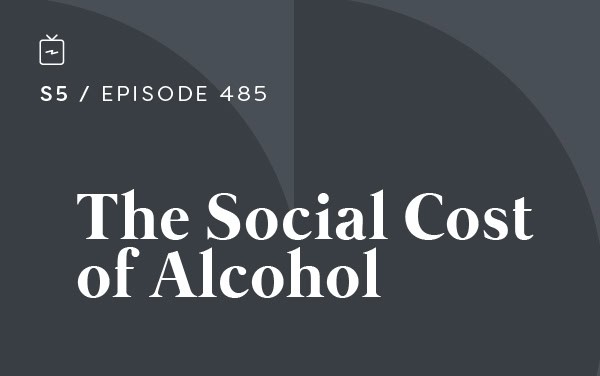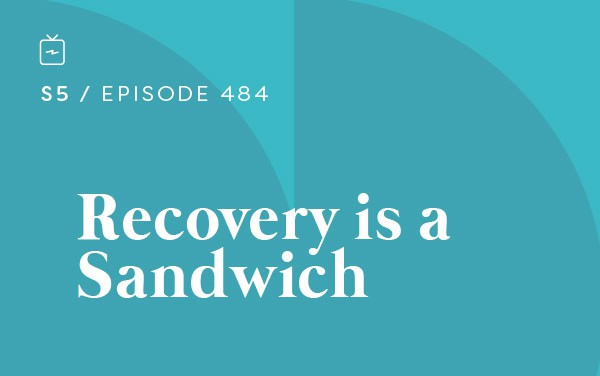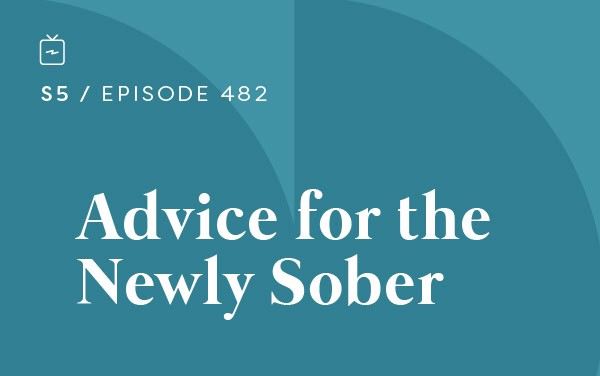
by Kris Oyen | Jun 10, 2024 | Podcast
Podcast: Play in new window | Download
Subscribe to the Recovery Elevator Podcast Apple Podcasts | | More
Episode 486 – The Most Dangerous Thing on the Planet
Today we have Adam. He is 46 from Flowermound, TX and took his last drink on December 31st, 2022.
Recovery Elevator is going to Vietnam January 9th-20th, 2025. Registration for our newest alcohol-free travel trip opens July 1st. We have room for 25 passengers to this southeast Asia destination. We have AF workshops, a home stay and a service project planned, plus you’ll be traveling with others who have already ditched the booze.
Better Help: www.betterhelp.com/elevator – 10% off your first month. #sponsored
[03:00] Thoughts from Paul:
Paul shares many things that are dangerous but concludes that the most dangerous thing on the planet is the Ego. The reason why it is so dangerous is because it is never fully satisfied, it’s always hungry, lives in constant state of lack and is always seeking more, more, more.
Alcohol is but a symptom of the most dangerous thing on the planet. Addiction gets a bad rap, but it does serve a purpose. It forces you to split from the thinking mind. As the author of The Untethered Soul, Michael Singer says you are the one hearing or witnessing the thoughts, but you are not your thoughts.
Some of the humblest people Paul has met have been people in recovery. The addiction is the equalizer and forces us to seek a better way no longer guided by the blind pursuit of the ego.
Sober Link. Sign up for a $50 off promo code.
[10:22] Kris introduces Adam:
Adam is a registered nurse, married to his wife for 23 years and they have two children. He loves hiking, camping and walking and enjoys tabletop gaming and the creativity and childlike innocence that it has awoken.
Alcohol was not very present in Adam’s childhood household. When he was 15, he had a bad experience with hamburgers and cheap alcohol that kept him away for a while. Typical teenage experimentation was there, but not much booze in his high school years.
Becoming a young adult found Adam at college and going to a lot of parties. The heavier partying led to Adam beginning to have blackouts and hangovers. He ended up going to the Appalachian Mountains for some mission work and to get away from his dissonance around substance use. He says it still followed him there and eventually he had to go back home.
Adam says drinking was part of he and his wife’s early dating period. After getting married and having kids, Adam was working 45 minutes from home and found himself drinking on the way home from work and the drinking was becoming daily. He knew it didn’t feel right but continued to do it. Deciding to start nursing school after the birth of their second child was very stressful and Adam’s drinking eventually found him seeking to stop but with short stints of sobriety, he would go back and feel stuck. This continued for Adam for a while and started to affect his relationships.
Adam feels he finally had a time where it just clicked for him. He had joined Café RE and then joined the Restore course and he was able to organize some tools and awareness around his drinking. He knew he had work to do but he was willing to work on it finally. He currently has a great support network and close friends that he is doing the work with. Adam feels that a lot of things about him have changed and every day he sees joy.
Adam’s biggest fear around quitting drinking: the fear of not having fun
Adam’s plan moving forward: staying connected and immersed
Adam’s parting piece of guidance for people thinking about quitting drinking: it makes the world colorful again and life will move in the direction it’s supposed to move.
Café RE – promo code OPPORTUNITY waives set up fee.
RE merch
Instagram
Recovery Elevator YouTube
Sobriety Tracker iTunes
Recovery Elevator
It all starts from the inside out.
I love you guys.

by Kris Oyen | Jun 3, 2024 | Podcast
Podcast: Play in new window | Download
Subscribe to the Recovery Elevator Podcast Apple Podcasts | | More
Episode 485 – The Social Cost of Alcohol
Today we have Jennifer. She is 41 from Hamilton, OT Canada and took her last drink on January 18th, 2024.
Recovery Elevator is going to Vietnam January 9th-20th, 2025. Registration for our newest alcohol-free travel trip opens July 1st.
Better Help: www.betterhelp.com/elevator – 10% off your first month. #sponsored
[02:09] Thoughts from Paul:
Paul shares some information from an article he saw on the Instagram page recoveryroadmap.me. It discusses how in Canada, despite bringing in $13 billion in tax revenue, the net social costs in 2020 was $19 billion. And it is even worse in the US.
The bright side of all of this is that we are becoming aware of this major deficit, and change is taking place. The demand for alcohol is lowering as people are becoming more aware that alcohol is not good for you. Two years ago, The Huberman Lab did a podcast called What Alcohol Does to Your Body and he debunked the myth that alcohol is good for you.
Paul also shares that thanks to an initiative called Sounds Right, musicians who use natural sounds can list “Nature” as a featured artist and royalties from the tracks will go toward environmental causes.
Exact Nature: https://exactnature.com/RE20
[08:33] Paul introduces Jennifer:
Jennifer is married and they have a daughter and a standard poodle. She works for the family business and for fun she plays paintball, tennis and volleyball – anything active with friends.
Jennifer says that as the “good girl” growing up, she always wanted to be bad and says that drinking fit in with that. During the week she was excelling in school, but on the weekends, she went to raves with friends and started smoking weed. She enjoyed the duality of her life and the same pattern continued at university.
While in her first year of college, her father bought back his company with a ten-year plan of Jennifer becoming the CEO. The stress and responsibility of this and her parents divorce a few years later all found her drinking escalating. Some of her friends told Jennifer’s mom about her drinking and staged a small intervention to which Jennifer was not receptive. She assured everyone she was ok, but then just began to isolate when she drank.
After the plan found her becoming the CEO, her drinking went from nights and weekends to drinking all day just to cope. She recognized that this was a problem but was scared to mention it to anyone. This is when she first joined Café RE, started listening to podcasts and trying to learn more about the disease. Jennifer tried a lot of moderation methods but was never successful until she got pregnant with her daughter at 35. She was able to quit drinking while pregnant and a few months after having the baby.
After returning to work, Jennifer says her drinking started right where she left off. She says she was beginning to have disturbing thoughts and finally concluded that she needed help. Not being able to come up with a good way to quit without anyone knowing, she decided to confide in her cousin who she knew would understand.
In January of 2024 at a dinner with her cousin, mom and husband, Jennifer was able to burn the ships, and everyone was very supportive. Upon going to treatment shortly after, Jennifer says she took her recovery very seriously and wanted to make it worth her time.
Journaling and practicing mindfulness are big parts of Jennifer’s recovery, she takes time to be present with her daughter and her life, attends meetings and counseling regularly and says stacking habits are important to her growth. Nurturing the sober version of herself has been great for her. Jennifer can see a future now
Jennifer’s best sober moment: Walking my daughter to school and being present.
Jennnifer’s parting piece of guidance: Don’t be afraid to ask for help.
Café RE – promo code OPPORTUNITY waives set up fee.
RE merch
Instagram
Recovery Elevator YouTube
Sobriety Tracker iTunes
Recovery Elevator
It all starts from the inside out.
I love you guys.

by Kris Oyen | May 27, 2024 | Podcast
Podcast: Play in new window | Download
Subscribe to the Recovery Elevator Podcast Apple Podcasts | | More
Episode 484 – Recovery is a Sandwich
Today we have Brian. He is 59 from Eastern Iowa. He took his last drink on May 23rd, 2023.
Recovery Elevator is going to Vietnam January 9th-20th, 2025. Registration for our newest alcohol-free travel trip opens July 1st and we’ve got room for 25 passengers. Who’s up for seeing the world with a group of travelers who have ditched the booze?
Better Help: www.betterhelp.com/elevator – 10% off your first month. #sponsored
[02:24] Thoughts from Kris:
Kris’ topic today is one of the foundational themes in recovery which is telling our story or burning the ships as we refer to it at Recovery Elevator.
Burning the Ships refers to when Hernan Cortez sailed across the ocean and ordered his men to burn their ships when they landed. There was no turning back, no retreat. When we share our story, we can no longer hide from it and are faced to move forward with others having knowledge of our journey.
This isn’t a black and white situation so it will be different for everyone, and we each have to do what is right for us. Kris shares the different levels of burning the ships and his experiences with them. He feels that the positives outweigh the negatives. When people hear our stories, not just the stats, it changes their perception. Hearing our stories in others’, helps us know we are not alone, and we never know the impact that sharing our stories may have on others.
Think of the moments that have inspired you. What is your version of that? Let Kris know what you think. How has burning the ships played out for you? Email kris@recoveryelevator.com to share your thoughts.
Athletic Greens: https://www.athleticgreens.com/recovery
[10:48] Kris introduces Brian:
Upon the release of this episode, Brian has just celebrated one year of sobriety!
He is married, together they have five adult children and seven grandchildren. Brian is active and enjoys many outdoor activities, home projects, travelling and reading.
Brian grew up on a farm and recalls it was common for people to have drinks after a long day of work. He says he and his friends would sneak beer out of curiosity. When he was in his teens, he and his friends would drive around the gravel roads with a cooler of beer. After graduating high school, Brian joined the military, which was a tradition in his family. He was enlisted for two years and lived the “work hard, play hard” life that is common in that environment.
Shortly after discharge from the Army, Brian got a DUI. He did not feel this was a red flag to stop drinking, just needed to pay the fine and move on. After graduating college, he got his first job in management and married his first wife. They bought land and started a family together. Brian says drinking was mostly social on the weekends and at the local tavern after work.
Brian and his wife got a divorce after 15 years married. Soon after, Brian began suffering from extreme anxiety and panic attacks. He tried medication and meditation to deal with it, but it was still intense.
A few years later, Brian started dating his current wife. They were very social and frequently drank, but she was not a heavy drinker. Brian began to find himself waking up with anxiety and would often change his work hours to accommodate his drinking or recovery from the night before.
In December of 2020 Brian discovered his sister had recently become sober. He feels this really led him to examine his drinking. Upon arriving home from that visit, he started reading a lot and listening to podcasts. He began attending more group chats with Café RE and connecting with other folks in recovery. Brian says his sister taught him a lot of mindfulness exercises which he has found very helpful.
Brian’s parting piece of guidance for those considering sobriety: just dig in and try it.
Café RE – promo code OPPORTUNITY waives set up fee.
RE merch
Instagram
Recovery Elevator YouTube
Sobriety Tracker iTunes
Recovery Elevator
I love you guys.
Go big because eventually we’ll all go home.

by Kris Oyen | May 20, 2024 | Podcast
Podcast: Play in new window | Download
Subscribe to the Recovery Elevator Podcast Apple Podcasts | | More
Episode 483 – NA Beers
Today we have Tyler. He is 37 and lives in Phoenix, AZ. He took his last drink on November 28th, 2023.
Recovery Elevator welcomes Danielle Marr to the team! She now writes the bi-monthly newsletter for RE which always has journalling prompts at the end. She taught our DTB writing course this last fall and does Instagram posts a couple days a week. She was also interviewed on episode 464.
To subscribe to the Recovery Elevator newsletter, click here and wait for the box to pop up.
Better Help: www.betterhelp.com/elevator – 10% off your first month. #sponsored
[03:35] Thoughts from Paul
Paul shares with us the history of NA beers and how they were created to pacify the Mothers Against Drunk Drivers campaign back in the 90’s. The companies had zero intention of scaling this segment of their business and it has been said that the purposefully made the beer tasteless and bland.
Those days are gone. Non-alcoholic beer sales have been growing every year by 30-40% since 2019. Many of the major beer brands are investing time and money into creating their own NA products and there are more breweries popping up that are 100% dedicated to making an AF craft beer.
There is no need to explore the NA beer world in the early days of your alcohol-free life because it can be triggering. There is trace amount of alcohol in many of the NA beers (usually less than 0.5%) and you would have to drink 25-30 of them to reach the legal BAC. Check out this Instagram post where someone drinks several NA beers and stills blows zeros into a breathalyzer.
What the AF beer world exploding shows is that people are waking up to the fact that alcohol is not good for you and big alcohol sales are reflecting that. The stigma around alcohol addiction is also crumbling. We as consumers decide every move a business makes – start asking for more AF options at restaurants and grocery stores. Start asking and you will receive.
Go Brewing. Use the code ELEVATOR for 15% off.
[09:58] Paul introduces Tyler:
Tyler is 37 years old and lives in Phoenix, AZ and has a six-month-old daughter. He does maintenance for a homeowners association. Tyler is also a musician and enjoys performing, writing, and recording music.
Tyler had his first drink when he was in high school as simply a fun thing to do with friends. A health scare which ended up with tumor removal drove Tyler to feel he needed to live life to the fullest. He says his drinking increased as it was associated with having fun, and he discovered his passion for being a musician. That found him romanticizing alcohol, drinking more after gigs, and acquiring DUIs. Since a lot of people he knew had DUIs, it was considered normal and wasn’t taking seriously.
When he lost a close family member to cancer, Tyler says his drinking evolved from good and bad to ugly. He and his girlfriend went out often, and his drinking became more frequent both while out and while at home. Tyler had a lot of anger that would come out while drinking. These issues eventually found Tyler and his girlfriend splitting up.
Tyler started going to therapy and discovered that the loss of his aunt affected him more than he realized. He was able to process some of his anger and cut back on his drinking. He and his girlfriend got back together and six months ago their daughter was born. Tyler began to realize that his drinking was interfering with this new life and told his girlfriend he was ready to quit. At this time, he also reached out to a supportive cousin that has over 20 years in recovery.
Tyler says AA didn’t resonate with him, but books, podcasts and other peoples’ stories have been very helpful. He believes in recovering out loud.
Café RE – promo code OPPORTUNITY waives set up fee.
RE merch
Instagram
Recovery Elevator YouTube
Sobriety Tracker iTunes
Recovery Elevator
I love you guys.
Go big because eventually we’ll all go home.

by Kris Oyen | May 13, 2024 | Podcast
Podcast: Play in new window | Download
Subscribe to the Recovery Elevator Podcast Apple Podcasts | | More
Episode 482 – Anna
Today we have Anna. She is 49 from North Georgia and took her last drink on December 22nd, 2017.
Better Help: www.betterhelp.com/elevator – 10% off your first month. #sponsored
[02:09] Thoughts from Paul:
A few weeks ago, Paul made a post on the Recovery Elevator Instagram pages asking people what advice they would give to somebody who was about to quit drinking.
Thank you to everyone that commented on the video, there were well over 100 comments.
In this episode, he shares some of the comments and be sure to follow Recovery Elevator on Instagram if you don’t already.
The most common advice was don’t do this alone, reach out for help, and join a community.
We have partnered with Sober Link. You can find some tips and can sign up for a $50 off promo code.
[11:16] Kris introduces Anna:
Anna lives in North Georgia and is a custodian at a middle school. For fun she enjoys hiking, camping and all things outdoors.
Anna first started drinking when she was 18 in college. Prior to that she was focused on being a runner and it was when an injury made her stop that she traded her running addiction for alcohol. She says that she was a blackout drinker from the beginning.
When asked by her now ex-husband why she drank Anna said it was because she wanted to. She believed it was a privilege to drink as long as she was keeping up with her responsibilities. At the time she didn’t believe that it wasn’t normal to be throwing up in the bathroom every day. She considered drinks as a reward for getting things done.
Anna got a DUI and was required to attend a recovery center. That put her back in contact with other people and she realized that she missed being social and doing things with other people. Her last day of drinking was when she went Christmas shopping and told herself that she wasn’t going to drink, but she did. The next morning, her kids told her they weren’t able to wake her up the night before. That’s when Anna realized she had lost the privilege and the desire to drink was gone.
About three weeks after that, she started attending AA and a group called FAVOR which had a kickball team. She enjoyed being able to do things with other people who didn’t drink. One of the reasons she was hesitant to quit drinking before was because she felt alcohol was involved in everything social.
Anna says that the 12 steps are a lifestyle for her. She enjoys the structure and routine of AA. After a few months, she got a sponsor and began to work the steps. Anna says that she enjoys being open minded about recovery and participating in things that are not AA. The first 90 days in recovery, Anna says she was very go with the flow. She feels she learned all she could from alcohol and was ready to learn the joy of recovery and getting to meet new people and learn new things again.
In sobriety, Anna enjoys traveling and meeting new people. She feels that life is meant to be experienced and she knows she has to take chances and meet new people. Anna feels she always has a group everywhere she goes. Sobriety gave Anna her confidence back and a sense of purpose. She feels that life challenges haven’t been nearly as hard since she is sober.
Anna’s favorite resource in recovery: “Café RE or AA, whatever I can get my hands on first if it’s just picking up and scrolling through Facebook or YouTube with listening to speakers.”
Anna’s parting piece of guidance: keep things simple, don’t compare yourself to other people, remember you cannot get drunk if you don’t pick up the first drink.
Café RE – promo code OPPORTUNITY waives set up fee.
RE merch
Instagram
Recovery Elevator YouTube
Sobriety Tracker iTunes
Recovery Elevator
We’re the only ones that can do this RE, but we don’t have to do it alone.
I love you guys.







